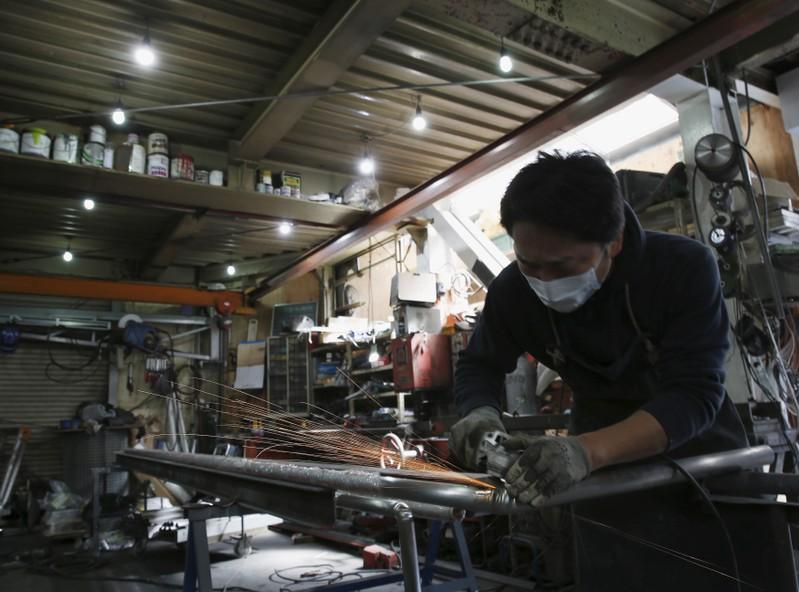Factory activity contracted in most Asian countries last month as an escalating trade war between Washington and Beijing raised fears of a global economic downturn and heaped pressure on policymakers in the region and beyond to roll out more stimulus.
Such growth indicators are likely to deteriorate further in coming months as higher trade tariffs take their toll on global commerce and further dent business and consumer sentiment leading to job losses and delays in investment decisions.
Some economists predict a world recession and a renewed race to the bottom on interest rates if trade tensions fail to ease at a Group of 20 summit in Osaka, Japan at the end of June, when presidents Donald Trump and Xi Jinping could meet.
In China, Asia’s economic heartbeat, the Caixin/Markit Manufacturing Purchasing Managers’ Index (PMI) showed modest expansion at 50.2, offering investors some near-term relief after an official gauge on Friday showed contraction.
The outlook, however, remained grim as output growth slipped, factory prices stalled and businesses were the least optimistic on production since the survey series began in April 2012.
PMIs were below the 50-point mark separating contraction from expansion in Japan, South Korea, Malaysia and Taiwan, came below expectations in Vietnam and improved slightly in the Philippines.
“The additional shock from the escalated trade tensions is not going to be good for global trade and if demand in the U.S., China and Europe continues to soften, which is very likely, it will bode ill for Asia as a whole,” said Aidan Yao, senior emerging markets economist at AXA Investment Managers.
“In terms of the monetary policy response, almost everywhere the race is going to be to the downside.”
Central banks in Australia and India are expected to cut rates this week, with others around the world seen following suit in coming weeks and months. HSBC economist Jingyang Chen said the PMI figures could mean “Beijing will double down on easing for the private corporate sector.”
Euro zone activity is expected to shrink as well, while U.S. manufacturing is expected to grow steadily, although economists expect the global malaise to eventually feed back into the U.S. economy. Fed funds rate futures are now almost fully pricing in a rate cut by September, with about 50 percent chance of a move by July 30-31.
J.P. Morgan expects the Federal Reserve to cut rates twice this year, a major change from its previous forecast that rates will stay on hold until the end of 2020.
India, one of the world’s leaders in terms of growth, will publish PMI data later on Monday. On Friday, data showed the economy growing at its slowest pace in more than four years in January-March.
The expansion in Philippines reflects strong domestic demand and less reliance on trade, while for Vietnam it is a reflection of a diversion of business and trade flows due to the tariffs.
A Societe Generale analysis shows that in industries affected by the implemented tariffs — such as capital goods and some electronics — Germany, Mexico, South Korea and Taiwan have each won more U.S. business.
Vietnam has been the biggest beneficiary in industries where tariffs are a threat, such as smartphones, and is also seeing investment from companies moving production out of China.
“Southeast Asian countries, especially Vietnam and Thailand, are often cited as the top choices, and indeed they look ready,” Societe Generale analysts said in a Friday note.
Ominously, South Korean exports - seen as a bellwether of world growth - fell 9.4% in May, worse than a median forecast for a 5.6% decline, data released on Saturday showed.
Recession fears
The trade conflict between China and the United States suddenly escalated last month when Trump raised tariffs on hundreds of billions of Chinese imports to 25% from 10% and threatened levies on all Chinese goods.
If that were to happen, and China were to retaliate, “we could end up in a (global) recession in three quarters,” says Chetan Ahya, global head of economics at Morgan Stanley.
Washington’s new tariff threats against Mexico last week also contributed to global recession fears, with stock markets tumbling around the world. The 10-year U.S. Treasuries yield fell to 2.121%, a nadir last seen in September 2017.
Over the weekend tensions flared again between China and the United States over trade, technology and security.
China’s Defence Minister Wei Fenghe warned the United States not to meddle in security disputes over Taiwan and the East Vietnam Sea, while acting U.S. Defence Secretary Patrick Shanahan said Washington would no longer “tiptoe” around Chinese behaviour in Asia.
On Friday, China also threatened to unveil an unprecedented hit-list of “unreliable” foreign firms, groups and individuals that harm the interests of Chinese companies. That came after Washington last month put Huawei on a blacklist that effectively blocks U.S. firms from doing business with the Chinese telecoms equipment giant.
“We take this seriously. It means that the trade war has not only become a technology war but also a broad-based business war. There will be more retaliation actions from China, especially for the technology sector,” Iris Pang, Greater China economist at ING, said, adding that the tensions over Taiwan were a background worry rather than a pressing concern.















































